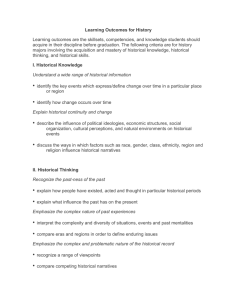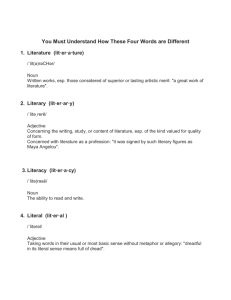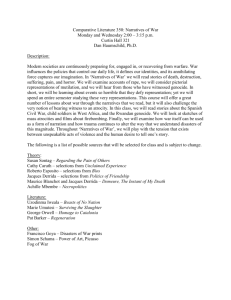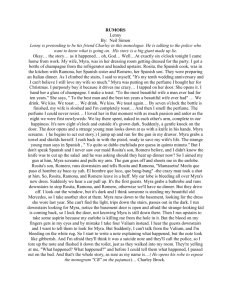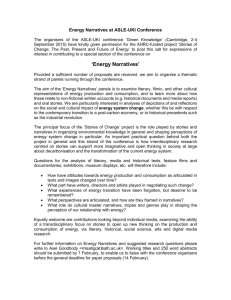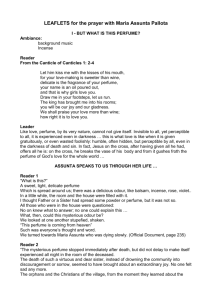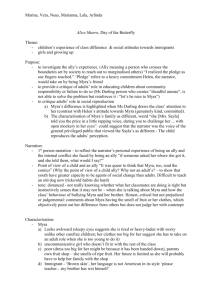Translation – Methodius ad Theodorum – First Draft
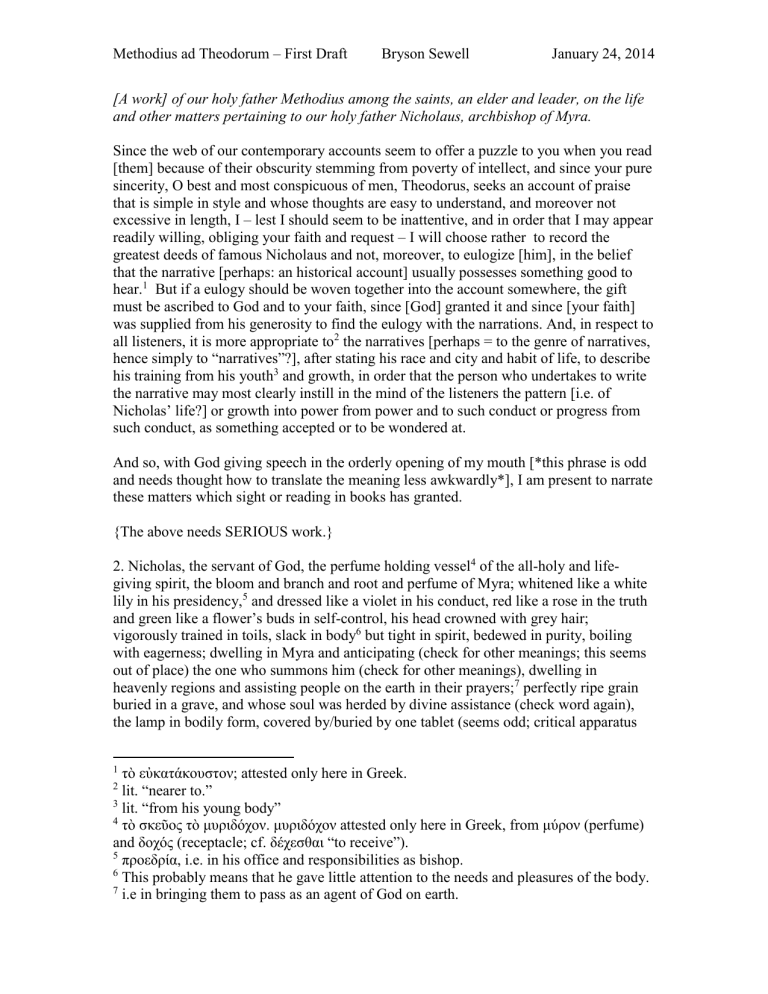
Methodius ad Theodorum – First Draft Bryson Sewell January 24, 2014
[A work] of our holy father Methodius among the saints, an elder and leader, on the life and other matters pertaining to our holy father Nicholaus, archbishop of Myra.
Since the web of our contemporary accounts seem to offer a puzzle to you when you read
[them] because of their obscurity stemming from poverty of intellect, and since your pure sincerity, O best and most conspicuous of men, Theodorus, seeks an account of praise that is simple in style and whose thoughts are easy to understand, and moreover not excessive in length, I – lest I should seem to be inattentive, and in order that I may appear readily willing, obliging your faith and request – I will choose rather to record the greatest deeds of famous Nicholaus and not, moreover, to eulogize [him], in the belief that the narrative [perhaps: an historical account] usually possesses something good to hear.
1
But if a eulogy should be woven together into the account somewhere, the gift must be ascribed to God and to your faith, since [God] granted it and since [your faith] was supplied from his generosity to find the eulogy with the narrations. And, in respect to all listeners, it is more appropriate to
2
the narratives [perhaps = to the genre of narratives, hence simply to “narratives”?], after stating his race and city and habit of life, to describe his training from his youth
3
and growth, in order that the person who undertakes to write the narrative may most clearly instill in the mind of the listeners the pattern [i.e. of
Nicholas’ life?] or growth into power from power and to such conduct or progress from such conduct, as something accepted or to be wondered at.
And so, with God giving speech in the orderly opening of my mouth [*this phrase is odd and needs thought how to translate the meaning less awkwardly*], I am present to narrate these matters which sight or reading in books has granted.
{The above needs SERIOUS work.}
2. Nicholas, the servant of God, the perfume holding vessel
4
of the all-holy and lifegiving spirit, the bloom and branch and root and perfume of Myra; whitened like a white lily in his presidency, 5 and dressed like a violet in his conduct, red like a rose in the truth and green like a flower’s buds in self-control, his head crowned with grey hair; vigorously trained in toils, slack in body
6
but tight in spirit, bedewed in purity, boiling with eagerness; dwelling in Myra and anticipating (check for other meanings; this seems out of place) the one who summons him (check for other meanings), dwelling in heavenly regions and assisting people on the earth in their prayers;
7
perfectly ripe grain buried in a grave, and whose soul was herded by divine assistance (check word again), the lamp in bodily form, covered by/buried by one tablet (seems odd; critical apparatus
1 τὸ εὐκατάκουστον; attested only here in Greek.
2
lit. “nearer to.”
3 lit. “from his young body”
4 τὸ σκεῦος τὸ μυριδόχον. μυριδόχον attested only here in Greek, from μύρον (perfume) and δοχός (receptacle; cf. δέχεσθαι “to receive”).
5
προεδρία, i.e. in his office and responsibilities as bishop.
6
This probably means that he gave little attention to the needs and pleasures of the body.
7 i.e in bringing them to pass as an agent of God on earth.
Methodius ad Theodorum – First Draft Bryson Sewell January 24, 2014 says the first few letters of the word are unreadable), and the colored charcoal/ruby…{here a line I don’t understand yet}…, the ember buried in very many hearts, a spark shared by more in respect of his name (For however many after him are called Nicholaus, all [of these people] have a share in sanctification because of him);
8
he who is present with all who call on him,
9
and freeing all who are in great difficulty – this man, who, by his daily virtue 10 [uncertain about this rendering] gathered together many names through his pursuits, but who has even more than those which are known which have escaped [us] – this man, born by the law of natural succession, is confined in/shut up in a place and city and way of life; since Christ, too [or maybe: since even Christ], the maker of times, who is above all time, chose to be born in time, ordaining for us orderliness in the times – but we were induced to speak this way about the servant of
Christ.
8
i.e. his very name had power to sanctify.
9
lit. “by whom he has been called upon.”
10
Rendering τῇ ἐπιουσίᾳ τῆς ἀρετῆς, an odd expression. There is attested no feminine noun ἐπιουσία, but it is here likely substantivised from the adjective ἐπιούσιος, “for the day,” in order to construct a lofty sounding phrase, “by the dailiness of his virtue,” and may simply mean τῇ ἐπιουσίᾳ ἀρετῇ, “by daily virtue,” which is how I translate it.


